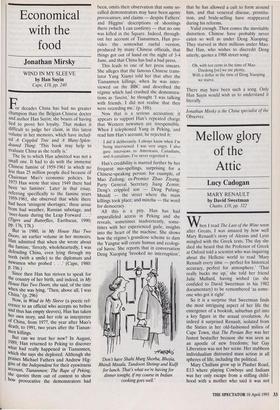Economical with the food
Jonathan Mirsky
WIND IN MY SLEEVE by Han Suyin Cape, ,f18, pp. 240 or decades China has had no greater champion than the Belgian-Chinese doctor and author Han Suyin; she boasts of having lied to prove her loyalty. That makes it difficult to judge her claim, in this latest volume in her memoirs, which have includ- ed A Crippled Tree and A Many-Splen- doured Thing: 'This book may help to evaluate China as she really is.'
The lie to which Han admitted was not a small one. It had to do with the immense Chinese famine of 1959-1961 in which no less than 25 million people died because of Chairman Mao's economic policies. In 1973 Han wrote that since 1949 there had been 'no famines'. Later in that essay, referring specifically to the famine years 1959-1961, she observed that while there had been 'stringent shortages,' these arose from bad weather, Russian sabotage, and 'over-haste during the Leap Forward . . .' (Tigers and Butterflies, Earthscan, 1990; PP. 176, 178.) But in 1980, in My House Has Two boors, an earlier volume in her memoirs, Han admitted that when she wrote about the famine, 'fiercely, wholeheartedly, I was defending China, even lying through my teeth (with a smile) to the diplomats and newsmen who probed . . .' (Cape, 1980: P. 196.) Since then Han has striven to speak for the country of her birth, and indeed, in My House Has Two Doors, she said, of the time When she was lying, 'Then, above all, [was China.' (p. 296) Now, in Wind in My Sleeve (a poetic ref- erence to an official who accepts no bribes and thus has empty sleeves), Han has taken her own story, and her role as interpreter of China; from 1977, the year after Mao's death, to 1991, two years after the Tianan- men killings. But can we trust her now? In August, 1989, Han returned to Peking to discover what had really happened in Tiananmen, Which she says she deplored. Although she Praises Michael Fathers and Andrew Hig- gins of the Independent for their eyewitness account, Tiananmen: The Rape of Peking, she quotes them out of context to show how provocative the demonstrators had been, omits their observation that some so- called demonstrators may have been agents provocateurs, and claims — despite Fathers' and Higgins' descriptions of shootings there (which I can confirm) — that no one was killed in the Square. Indeed, through- out her account of Tiananmen, Han pro- vides the somewhat rueful version, produced by many Chinese officials, that things got out of hand on the night of 3-4 June, and that China has had a bad press.
This leads to one of her press smears. She alleges that the famous Chinese trans- lator Yang Xianyi told her that after the Tiananmen killings, when he was inter- viewed on the BBC and described the regime which had crushed the demonstra- tions as 'fascist,' he thought 'I was talking with friends. I did not realise that they were recording me.' (p. 188).
Now that is a serious accusation: it appears to support Han's repeated charge that Western newsmen are irresponsible When I telephoned Yang in Peking, and read him Han's account, he rejected it:
I did it deliberately. I always know when I'm being interviewed. I was very angry. I also gave interviews to Americans, Canadians, and Australians. I've never regretted it ...
Han's credibility is marred further by her frequent mis-spellings, surprising for a Chinese-speaking person: for example, of Mao Zedong; ex-Premier Zhao Ziyang; Party General Secretary Jiang Zemin; Deng's crippled son — Deng Pufang; Muxidi — the street where the main killings took place; and minzhu — the word for democracy.
All this is a pity. Han has had unparalleled access in Peking and she reveals, sometimes inadvertently, some- times with her experienced guile, insights into the heart of the machine. She shows how the regime's grandiose scheme to dam the Yangtse will create human and ecologi- cal havoc. She reports that in conversation Deng Xiaoping 'brooked no interruption', Don't have Shahi Murg Shorba, Bhojia, Bhindi Masala, Tandoori Shrimp and Kulfi for lunch. That's what we're having for dinner tonight, if my course in Indian cooking goes well.'
that he has allowed a cult to form around him, and that venereal disease, prostitu- tion, and bride-selling have reappeared during his reforms.
Valid enough. Then comes the inevitable distortion. Chinese have probably never eaten so well as under Deng Xiaoping. They starved in their millions under Mao. But Han, who wishes to discredit Deng utterly, quotes a 1988 street song: Oh, with ten cents in the time of Mao Dzedong [sic] we ate plenty, With a dollar in the time of Deng Xiaoping we starve.
There may have been such a song. Only Han Suyin would wish us to understand it literally.
Jonathan Mirsky is the China specialist of the Observer.


























































 Previous page
Previous page